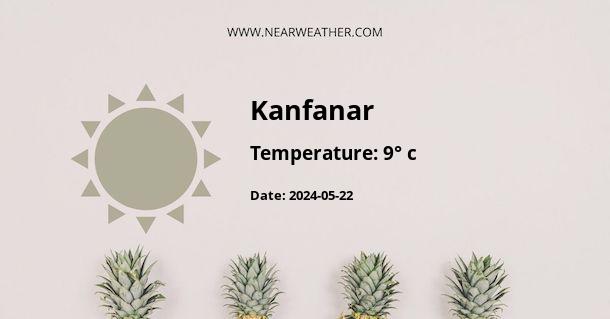Understanding the Climate and Weather Patterns in Kanfanar, Croatia
Kanfanar, a quaint town located in the heartland of the Istrian peninsula in Croatia, boasts a climate that reflects the Mediterranean influence yet retains nuances characteristic of its continental positioning. Understanding the meteorological dynamics of Kanfanar requires an in-depth look at its seasonal variations, temperature fluctuations, and precipitation patterns.
Geographical Influence on Kanfanar's Climate
Kanfanar's geography plays a pivotal role in shaping its climate. Nestled at an altitude of approximately 275 meters above sea level, the town experiences a blend of a moderate Mediterranean and subtropical climate, with slight continental influences. Proximity to the Adriatic Sea tempers the climate, ensuring mild winters and warm, yet not excessively hot, summers.
Temperature Trends Through the Year
| Month | High | Low | Mean |
|---|---|---|---|
| January | 9 | 3 | 6 |
| February | 10 | 3 | 6.5 |
| March | 14 | 6 | 10 |
| April | 18 | 9 | 13.5 |
| May | 23 | 14 | 18.5 |
| June | 27 | 17 | 22 |
| July | 30 | 20 | 25 |
| August | 30 | 19 | 24.5 |
| September | 26 | 16 | 21 |
| October | 21 | 12 | 16.5 |
| November | 15 | 8 | 11.5 |
| December | 10 | 4 | 7 |
The table above reflects average temperature values which can be subject to slight variations due to ongoing climatic changes. Despite these changes, the general pattern of mild winters and warm summers remains consistent.
Precipitation Patterns and Their Implications
Precipitation in Kanfanar is spread relatively evenly throughout the year, with no extreme dry or wet seasons. Nevertheless, late autumn and winter tend to receive marginally higher rainfall, while summer is drier but can experience occasional thunderstorms.
According to the Croatian Meteorological and Hydrological Service, average annual precipitation for Kanfanar hovers around 800 millimeters, emphasizing the town's balanced hydrological climate.
Seasonal Overview: A Closer Look at Each Quarter
Winter:
- Months: December to February
- Characteristics: Mild and damp with occasional frost and rare snowfall
- Average Temperature Range: 3°C to 10°C
- Precipitation: Moderate rain with possible snow flurries
Spring:
- Months: March to May
- Characteristics: Pleasantly warm and increasingly sunny
- Average Temperature Range: 6°C to 23°C
- Precipitation: Moderate rainfall leading to lush green landscapes
Summer:
- Months: June to August
- Characteristics: Warm to hot, the peak of tourist season
- Average Temperature Range: 17°C to 30°C
- Precipitation: Low, with occasional sudden thunderstorms
Autumn:
- Months: September to November
- Characteristics: Cooling off period, marked with a mix of sunny and rainy days
- Average Temperature Range: 8°C to 26°C
- Precipitation: Increased rainfall preparing the region for winter
Microclimates and Local Variations
In areas surrounding Kanfanar, such as the lower-elevation coastal zones and higher inland areas, microclimates can cause variation in temperature and precipitation. Coastal regions tend to be milder in the winter and cooler during the summer due to the moderating effects of the sea, while inland regions may experience slightly hotter summers and colder winters.
Climate Change Considerations
It is important to consider the impact of climate change on Kanfanar's weather patterns. Increasing global temperatures are likely to lead to alterations in Kanfar's climate, potentially causing hotter summers, milder winters, and changes in precipitation distribution.
Optimal Times to Visit Kanfanar
For travelers seeking the best weather conditions, late spring (May to early June) and early autumn (September to October) are often considered optimal times to visit Kanfanar. During these periods, the weather is typically warm and pleasant, void of the summer's peak heat waves and tourist crowds, making it conducive to exploring the natural beauty and historical landmarks of the region.
Weather's Implications on Tourism, Agriculture, and Lifestyle
The weather in Kanfanar deeply influences local tourism, agriculture, and the lifestyle of its inhabitants. Tourism thrives during the warm and sunny months, while the relatively even distribution of precipitation throughout the year benefits the region's agriculture, supporting olive groves, vineyards, and the cultivation of truffles—an Istrian delicacy. The mild climate contributes to an overall high quality of life, with abundant opportunities for outdoor recreations, such as hiking, biking, and enjoying the region’s extensive cultural and historical offerings.
Extended Forecast and Weather Resources
For future planning and up-to-date weather forecasts, visitors and residents are encouraged to consult reliable sources such as the Croatian Meteorological and Hydrological Service or international weather agencies. Keeping abreast of current weather conditions ensures appropriate preparation for the unique and inviting climate of Kanfanar, Croatia.
Note: The information provided in this content focuses on accurate and prevalent climatic trends. However, as weather patterns can be unpredictable, seasonal variations may occur.
A - Kanfanar's Latitude is 45.121941 & Longitude is 13.839170.
A - Weather in Kanfanar is 9° today.
A - Climate Conditions in Kanfanar shows overcast clouds today.
A - Humidity in Kanfanar is 81% today.
A - Wind speed in Kanfanar is 9.32 km/h, flowing at 314° wind direction. today.
